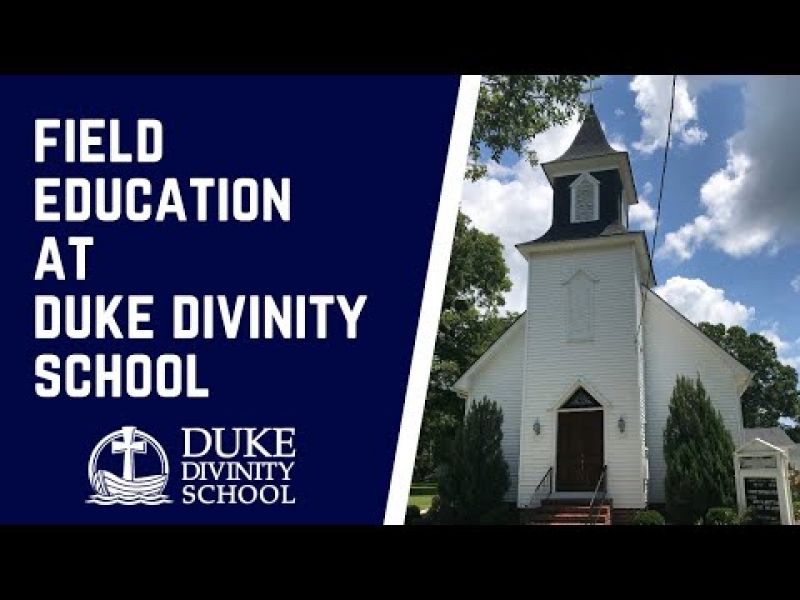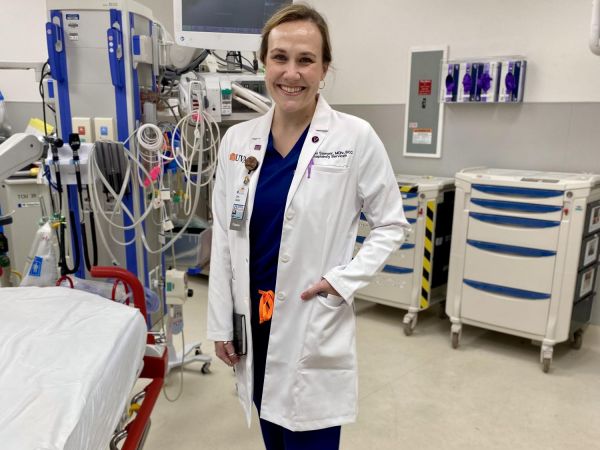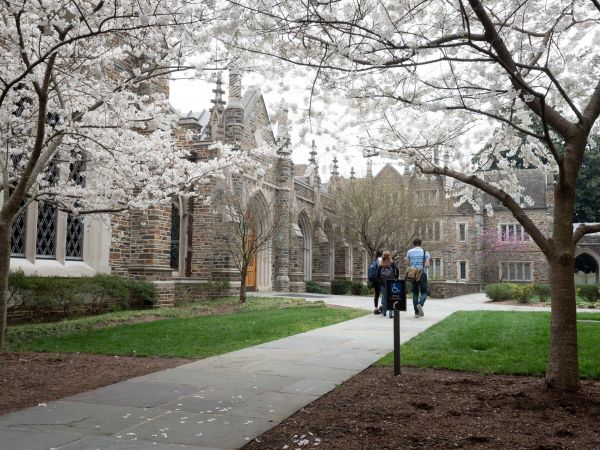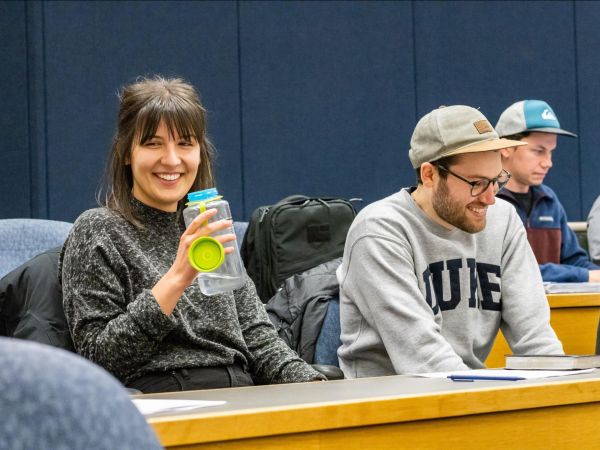When you’re ready to follow God’s call to service and ministry, we’re here to help you take the next steps. With rich academic courses, intentional ministerial formation, and focused theological reflection, a Master of Divinity (M.Div.) degree at Duke Divinity School will develop your imagination and prepare you to meet the challenges facing the church, academy, and world of tomorrow.
Need a flexible M.Div. option?
Our Hybrid M.Div. program gives you access to rigorous preparation in a flexible format. It will prepare you to lead and transform your faith without requiring you to move to Durham.
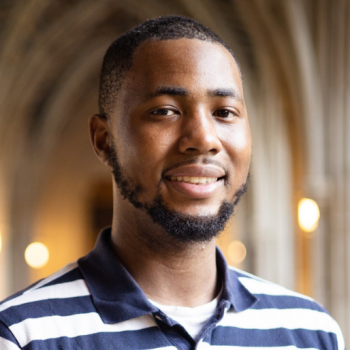
I feel called to faith-based organizing through the church. Given my non-traditional calling I assumed Duke Divinity would not offer much formation for me, but I’m grateful to say Duke continues to equip me for my call. Through the Thriving Communities Fellowship, Grad Engage (through the Kenan Institute for Ethics), and field education, I’ve gained plenty of practical formation in community organizing. In the classroom, I’ve gotten plenty of theory that complements and guides my praxis.
Black Church Studies and Latinx Studies Fellowship
In addition to receiving full-tuition scholarships, Black Church Studies and Latinx Studies fellows participate in signature programming tailored to their vocational aims, including mentoring, cohort-based professional formation and events, and the ability to earn the Certificate in Black Church Studies or the Certificate in Latinx Studies. Fellows are also eligible to receive stipends totaling up to $40,000 through participation in internships offered by the Office of Field Education in Latinx or Black church contexts.


Interdisciplinary Opportunities
Within Divinity courses, students have opportunities for in-depth exploration of critical theological issues that face contemporary society. For instance, you can take a class with Project TURN, in which incarcerated men and women study alongside Duke Divinity School students; engage connections between food and faith with Professor Norman Wirzba; discover the intersections of theology and the arts with DITA; explore connections between Christianity and medicine with practicing physicians and theologians. Students can take two classes outside of Divinity School course offerings, taking advantage of our position at the center of a premier research institution with 10 graduate and professional schools.
Houses of Study
Our houses of study help prepare you for service—and ordination—in the communities and denominations where you’ll serve. They include the Methodist/Wesleyan House of Studies, the Baptist House of Studies, the Anglican Episcopal House of Studies, the Presbyterian/Reformed House of Studies, the Office of Black Church Studies, the Asian House of Studies, and the Hispanic House of Studies.
Curriculum
The curriculum for our flagship degree program is designed to give students a solid foundation for wherever their calling takes them—be that ordination, lay ministry, nonprofit work, or a career in teaching. Our classes cover Old and New Testament, church history, Christian theology, world Christianity, ministry, worship, preaching, biblical languages, the Black Church, and a variety of electives. For a sample of a three-year residential M.Div. curriculum at Duke Divinity, see below.
First Year
Fall Semester
- Old Testament Core Course Part 1
- Church History Core Course Part 1
- Church Ministry Elective
- Biblical Language or Elective
Spring Semester
- Old Testament Core Course Part 2
- Church History Core Course Part 2
- New Testament Core Course
- Biblical Language or Elective
Second Year
Fall Semester
- Christian Theology Core Course
- American Christianity Core Course
- Preaching Core Course
- Black Church Studies Elective
- Elective
Spring Semester
- Christian Ethics Core Course
- New Testament Exegesis
- Elective
- Elective
Third Year
Fall Semester
- Practicing Theology in Ministry Elective
- World Christianity Elective
- Elective
- Elective
Spring Semester
- Elective
- Elective
- Elective
- Elective
Spiritual Formation
We form students for ministry in a variety of ways — through coursework, corporate worship, field education, service opportunities, houses of study, and denominational associations. Each first-year M.Div. student will have multiple options for intentional formation that will complement your academic work and field education opportunities. Students receive support and mentoring for vocational discernment and spiritual direction.
Graduation Requirements
The Master of Divinity is normally completed in three years. Requirements for graduation are:
- 24 courses comprising 8 core courses, 5 limited electives, and 11 electives
- 2 units of field education
- A spiritual formation component
- 2 student portfolios (one each in second and third years)
Need More Flexibility to Complete Your Degree?
Our Hybrid M.Div. curriculum offers a class schedule optimized for busy students and a pathway to earn your degree while staying in your current context, without moving to Durham. Contact the Office of Admissions for information on other options for completing your degree at (919) 660-3436 or admissions@div.duke.edu.
Intellectual Diversity in the Classroom
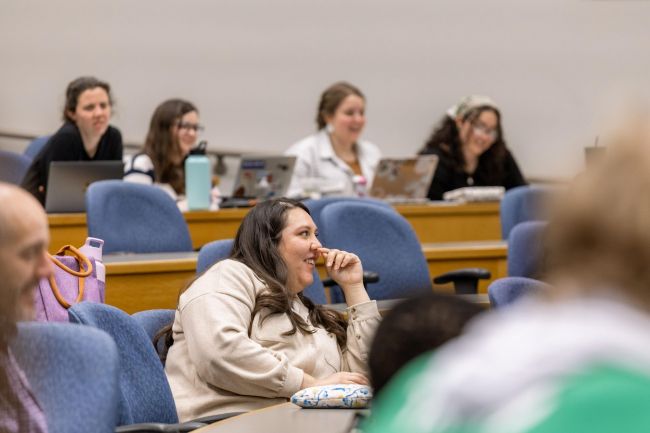
Academic Support at Duke Divinity
The Center for Writing and Academic Support provides services for writers of all abilities. In addition, we offer the RISE pre-orientation workshop to introduce the fundamentals of theological thought and writing; ongoing academic support workshops throughout the year; and tutors who are available to work with students one-on-one.
Certificates



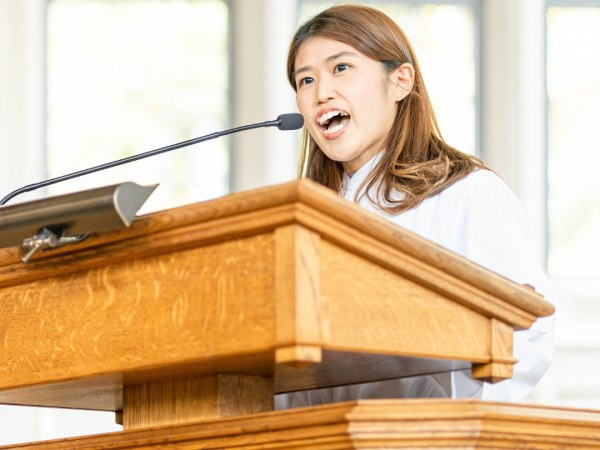

Dual Degree Options
An education from Duke Divinity School is worth your investment, and you do not have to figure out the finances alone.
All M.Div. students receive funding.
Duke Divinity School is investing in you, too. It is an investment in your education, the church, and our shared future. All M.Div. students receive some form of scholarship support from Duke Divinity School that will cover between 25% and 100% of tuition costs, and there is no separate application needed in order to be considered. The M.Div. program offers many fellowships that also provide tuition support. Many other internal and external scholarships, as well as federal financial aid in the form of work study and loans, make it possible for students to afford Duke Divinity. We are committed to ensuring that every student who hears the call to ministry can fund their education here. FAFSA should be completed for external aid. More information can be found in our Financial Aid section.

Field Education Funding
Duke Divinity is unique in its ability to provide funding for up to three field education internships (two placements are required for graduation). The Office of Field Education pairs students with dynamic ministry placements that can provide up to $10,000 per internship. This funding is in addition to any scholarships, grants, or outside aid that a student receives, and can result in as much as $40,000 in additional support throughout the course of the M.Div. program.
Lifelong Dividends
In addition to earning a degree from Duke Divinity School, you also receive benefits that continue to impact your life long after you leave. You’ll have space for learning timeless ministry skills, cultivating holy friendships that will sustain you, and forming relationships with faculty who can serve as mentors as your vocation unfolds. The overwhelming majority of our students say their investment is worth it.
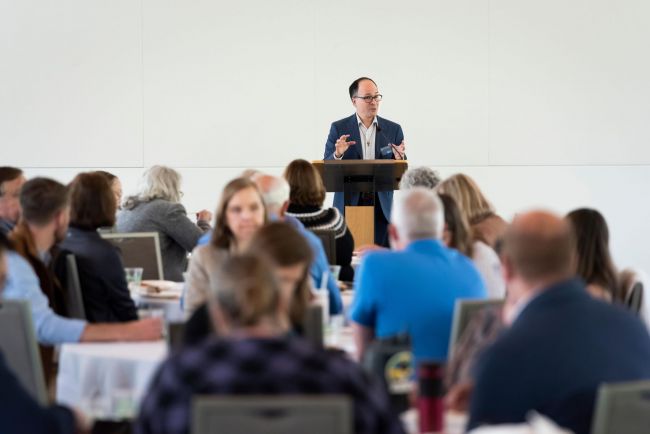
Ready for the Next Step?
Duke Divinity School accepts applications from students with a demonstrated commitment to some form of ordained or lay ministry and a minimum GPA of 2.75 in a bachelor’s degree from a regionally accredited college or university prior to the intended date of enrollment.
Request Info
Join our mailing list, and we'll send you more information.
Request Info about the schoolVisit Campus
The best way to learn more about us is to visit. Schedule an in-person or online visit.
Visit Us

